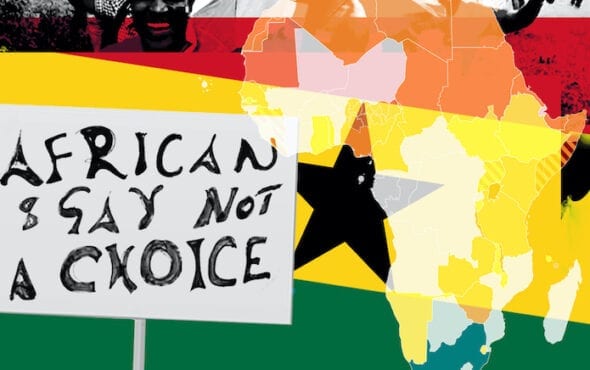
Lawmakers in Ghana are presenting legislation to criminalise the promotion of LGBTQ+ rights in the country.
Seven Ghanian MPs, including Samuel Nartey George, have presented a bill to ban LGBTQ+ advocacy in Ghana, according to Openly.
George, who is a member of the National Democratic Congress, took to social media justifying the need to ‘fight’ against LGBTQ+ rights and to uphold “traditions, culture and religious beliefs”.
The parliamentarian wrote: “We have taken a stance and announced our intention to present a Private Members Bill to expressly criminalise and ban the advocacy and act of homosexuality in all its current and future forms.
“The proposed Bill would strengthen and augment existing legislation on the subject. We owe it to ourselves and the people of Ghana to uphold that which gives us our identity as a people.
“It is our hope that before the end of this Session of Parliament, we would have passed the legislation through Parliament awaiting Presdential assent. May we unite in this fight against the scourge and perversion that homosexuality presents.”
On Monday, March 8, LGBTQ+ Rights Ghana called for an end to the harassment and threats towards sexual minorities in an open letter to President Nana Akufo-Addo.
“Mr President, our plea is not one which seeks to institutionalise same-sex civil unions. Ours at this very point is to have some peace in our country and to feel safe,” the letter read.
“Ours is asking that the state protect us from harm and that our sexual identifies do not become weaponised as a tool of oppression in violating our rights as established under the constitution.”
Dear @nakufoaddo
With humility
Thank you.#TogetherWeBuild #QueerGhanaianLivesMatter #GhanaGetsBetter pic.twitter.com/0XCmZtnQI2
— LGBT+ Rights Ghana (@LGBTRightsGhana) March 8, 2021
Amnesty International and CIVICUS and other organisations have spoken out over recent anti-LGBTQ+ events occurring in Ghana.
“CIVICUS is extremely concerned at the proposed tabulation of an anti-LGBTQI+ bill and the wave of intolerance against the LGBTQI+ community in Ghana,” said Mawethu Nkosana, LGBTQI+ Advocacy Lead at CIVICUS.
In a statement, Amnesty International addressed the Ghanian authorities to “publicly acknowledge the legitimacy and important work of human rights defenders, including LGBT+ rights defenders”.
In recent weeks, religious leaders and politicians successfully campaigning for the closure of Ghana’s first LGBTQ+ office which opened in January.
While the community was open, both the centre and LGBTQ+ Ghanaians have been subject to criticism and anti-LGBTQ+ abuse.
Ghana’s Catholic Bishops Conference (GCBC) issued a statement on the recent political discussions surrounding LGBTQ+ individuals and condemned the opening of the centre.
“We also write to support the position of Lawyer Moses Foh-Amoaning and the Coalition who for years has been championing the crusade against homosexuality,” the statement read.
Information Minister-designate, Kojo Oppong Nkrumah has also proposed legislation against the Ghanaian LGBTQ+ community.
Nkrumah argued the Constitution of Ghana proscribes expression on “some matters”, but believes this freedom of expression can be curtailed if the wider political context calls for it.
He states the constitution is subject to the “interest of national security, public order, [and] public morality”.
However, the Information Minister-designate stressed there are “limitations on rights and freedoms” and gave the example of Ghanaian’s advocating for LGBTQ+ inclusivity in the country.
Nkrumah’s displeasure with LGBTQ+ advocacy led to his suggestion that political bodies should be able to “contemplate legislation in the interest of public morality” so “you cannot advocate and promote LGBTQ+ activities”.
The minister’s proposed ruling would ensure no tolerance towards LGBTQ+ matters or individuals.
Ghana is among more than 70 countries and provinces around the world that still criminalises consensual same-sex relationships.
While individuals are often not prosecuted, they face discrimination and harassment regularly as same-sex relationships and LGBTQ+ tolerance is seen as culturally taboo.
In light of the Ghanaian fight for LGBTQ+ equality, celebrities and high-profile industry names such as Idris Elba, Edward Enninful and Naomi Campbell have come together to sign an open letter in support of Ghana’s LGBTQ+ community.
The letter has been signed by over 60 people that have Ghanaian heritage, but some individuals that do not (such as Naomi Campbell) have still opted to sign the document to showcase their support.



